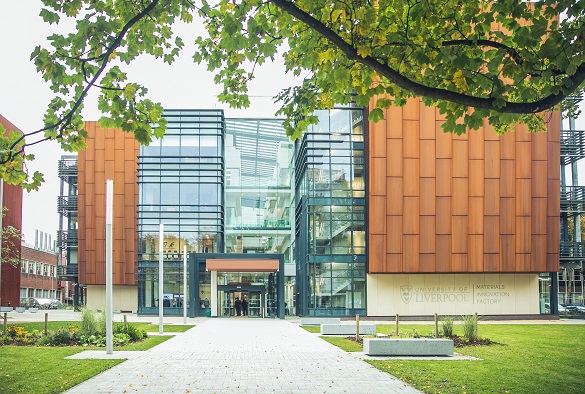£1.3M to develop the Low Carbon Chemistry Lab of the Future
Published on

The University’s Materials Innovation Factory has been awarded £1.3 million funding from Research England to develop the Low Carbon Chemistry Lab of the Future to make its research more environmentally sustainable and help address the net zero target.
A world-leading materials research facility, the MIF will introduce a range of processes and approaches to reduce its energy usage by an estimated 45% over the next four years and reduce its annual carbon footprint by the equivalent of 415,000kg of CO2.
The MIF will enhance its sophisticated building management systems to enable laboratory teams to proactively monitor their energy usage, introduce smarter control technologies to reduce the amount of energy used in labs and fume cupboards and fit solar panels on the roof space to generate power.
The funding has been made through a pilot initiative to explore how UK Research Partnership Investment Fund (UKRPIF) – funded research centres and facilities can be enhanced to tackle net zero carbon emission targets.
Created in collaboration with Unilever, the MIF is a 12,000m2 state of the art facility dedicated to the research and development of advanced materials. It provides laboratory and office space for more than 300 University researchers, scientists and commercial innovators.
It boasts one of the highest concentrations of materials science automation robotics in the world and is pioneering their use to accelerate the discovery and development of net zero materials and processes.
Professor Wiebe Van Der Hoek, Executive Pro Vice-Chancellor for the University's Faculty of Science & Engineering, said: “The MIF is a leading centre for advanced materials research and innovation with unique facilities.
“This project will allow us to take a holistic approach to the environmental sustainability of such a large-scale and high-energy use chemistry research facility.”
“Our joined up approach will have a marked impact on the carbon footprint of the MIF, and we will ensure that this approach is transferable to other large and complex lab environments, both on the University campus and in the wider HE and research sector.”
Research England Executive Chair, David Sweeney, said:
“The UK Research Partnership Investment Fund has a strong track record in funding state-of-art facilities that support world-leading research and strengthen partnerships between universities and other organisations active in research.
“By piloting these innovative approaches to tackling net zero in infrastructure, we hope that this scheme will help us to learn more about what works so that we and the HE sector can factor this into future activity and build upon the already successful UKRPIF model.”
Professor Duncan Wingham, Executive Chair of NERC and sponsor for Environmental Sustainability and Net Zero in UKRI, said:
“Our Environmental Sustainability Strategy commits UKRI to supporting the research sector to reduce its negative environmental impacts.
“This funding will help these leading national centres and facilities develop innovative solutions to reducing energy demand and increasing the use of renewable power in some unique research environments.
“UKRI is proud of its role in helping reduce carbon emissions from delivering cutting-edge research outputs in support of institutional and national net zero targets.”
The Low Carbon Chemistry Lab of the Future is one of nine projects supported with an £18.9 million investment by Research England, part of UK Research and Innovation, together with the Higher Education Funding Council for Wales and Scottish Funding Council.
The University of Liverpool is a signatory to the UN’s Sustainable Development Goals and is committed to embedding these across the institution, through research, teaching and learning, operations and community of staff, students and alumni. A new Sustainability Strategy was launched in 2021 which creates a long-term vision for our shared future that encapsulates our desire to act as global leaders in environmental, social and corporate sustainability. For further information, visit the University's Sustainability website.
Responding to the global climate crisis through research is the focus of the University of Liverpool’s Climate Futures Research theme. It brings together experts in a wide range of disciplines to explore impacts of climate change, develop solutions to environmental challenges and address knowledge gaps.